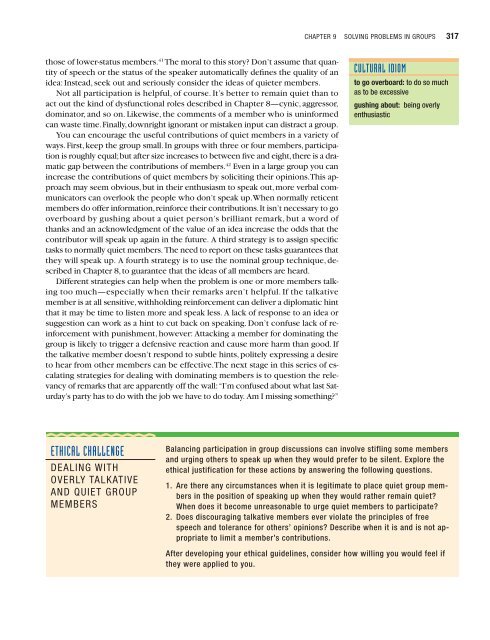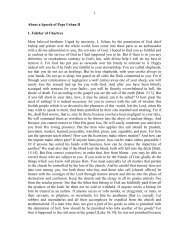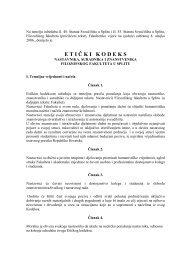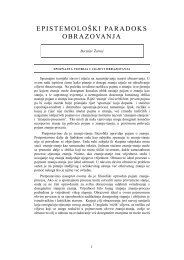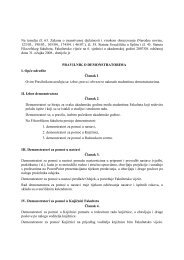Understanding Human Communication
Understanding Human Communication
Understanding Human Communication
You also want an ePaper? Increase the reach of your titles
YUMPU automatically turns print PDFs into web optimized ePapers that Google loves.
those of lower-status members. 41 The moral to this story? Don’t assume that quantity<br />
of speech or the status of the speaker automatically defines the quality of an<br />
idea: Instead, seek out and seriously consider the ideas of quieter members.<br />
Not all participation is helpful, of course. It’s better to remain quiet than to<br />
act out the kind of dysfunctional roles described in Chapter 8—cynic, aggressor,<br />
dominator, and so on. Likewise, the comments of a member who is uninformed<br />
can waste time.Finally,downright ignorant or mistaken input can distract a group.<br />
You can encourage the useful contributions of quiet members in a variety of<br />
ways. First, keep the group small. In groups with three or four members, participation<br />
is roughly equal;but after size increases to between five and eight,there is a dramatic<br />
gap between the contributions of members. 42 Even in a large group you can<br />
increase the contributions of quiet members by soliciting their opinions.This approach<br />
may seem obvious, but in their enthusiasm to speak out, more verbal communicators<br />
can overlook the people who don’t speak up.When normally reticent<br />
members do offer information,reinforce their contributions.It isn’t necessary to go<br />
overboard by gushing about a quiet person’s brilliant remark, but a word of<br />
thanks and an acknowledgment of the value of an idea increase the odds that the<br />
contributor will speak up again in the future. A third strategy is to assign specific<br />
tasks to normally quiet members. The need to report on these tasks guarantees that<br />
they will speak up. A fourth strategy is to use the nominal group technique, described<br />
in Chapter 8,to guarantee that the ideas of all members are heard.<br />
Different strategies can help when the problem is one or more members talking<br />
too much—especially when their remarks aren’t helpful. If the talkative<br />
member is at all sensitive,withholding reinforcement can deliver a diplomatic hint<br />
that it may be time to listen more and speak less. A lack of response to an idea or<br />
suggestion can work as a hint to cut back on speaking. Don’t confuse lack of reinforcement<br />
with punishment, however: Attacking a member for dominating the<br />
group is likely to trigger a defensive reaction and cause more harm than good. If<br />
the talkative member doesn’t respond to subtle hints, politely expressing a desire<br />
to hear from other members can be effective.The next stage in this series of escalating<br />
strategies for dealing with dominating members is to question the relevancy<br />
of remarks that are apparently off the wall:“I’m confused about what last Saturday’s<br />
party has to do with the job we have to do today. Am I missing something?”<br />
ETHICAL CHALLENGE<br />
DEALING WITH<br />
OVERLY TALKATIVE<br />
AND QUIET GROUP<br />
MEMBERS<br />
CHAPTER 9 SOLVING PROBLEMS IN GROUPS 317<br />
CULTURAL IDIOM<br />
to go overboard: to do so much<br />
as to be excessive<br />
gushing about: being overly<br />
enthusiastic<br />
Balancing participation in group discussions can involve stifling some members<br />
and urging others to speak up when they would prefer to be silent. Explore the<br />
ethical justification for these actions by answering the following questions.<br />
1. Are there any circumstances when it is legitimate to place quiet group members<br />
in the position of speaking up when they would rather remain quiet?<br />
When does it become unreasonable to urge quiet members to participate?<br />
2. Does discouraging talkative members ever violate the principles of free<br />
speech and tolerance for others’ opinions? Describe when it is and is not appropriate<br />
to limit a member’s contributions.<br />
After developing your ethical guidelines, consider how willing you would feel if<br />
they were applied to you.


